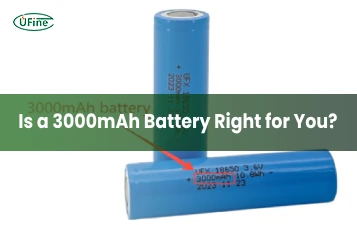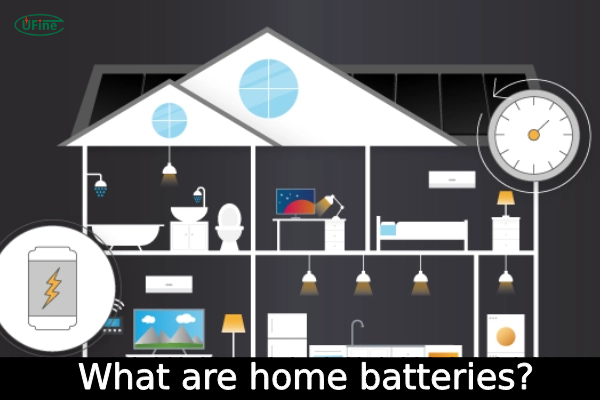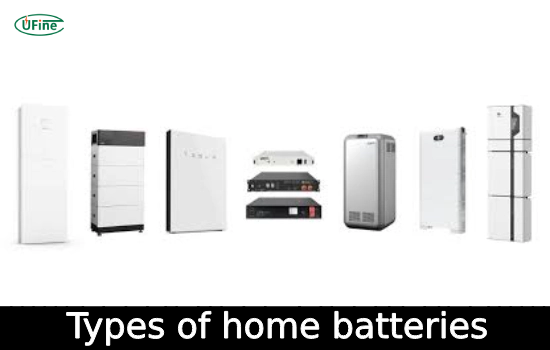Home batteries are like energy banks for houses. They save money on electricity and keep the lights on during emergencies. This guide shows why home batteries are helpful, the types you can choose from, and how to pick the best one. Whether thinking about solar power or preparing for blackouts, learning about home batteries can make your home more reliable and energy-efficient.
Part 1. What are home batteries?
Home batteries store electricity generated from solar panels or the grid for later use in residential settings. They are compact units installed indoors or outdoors, resembling large boxes with advanced technology. These batteries work silently, storing energy when electricity is abundant and releasing it when needed.
Home batteries play a crucial role in managing energy usage efficiently within households. They provide backup power during blackouts, ensuring lights stay on and essential appliances keep running. By storing excess energy from solar panels, home batteries enable homeowners to reduce reliance on the grid, saving money and promoting sustainability.
Why Home Batteries Are the Future of Energy Storage?
- Home batteries are leading the way towards a more sustainable future by optimizing energy use at the household level.
- They empower homeowners to take control of their energy consumption and reduce their carbon footprint.
- As renewable energy sources like solar power become more prevalent, home batteries offer a reliable means to store this clean energy for later use.
- The versatility and efficiency of home batteries make them a pivotal component in the transition to more innovative and greener energy solutions.
Part 2. Benefits of home batteries
Energy Savings
Home batteries help homeowners save money by storing excess electricity generated during off-peak hours or from solar panels. Homeowners can then use this stored energy during peak hours when electricity rates are higher, leading to significant savings on utility bills.
Backup Power
Home batteries’ primary benefit is their ability to provide backup electricity during blackouts or grid failures. This ensures that essential appliances such as refrigerators, lights, and medical devices continue to operate, improving safety and comfort during emergencies.
Energy Independence
By storing energy locally, homeowners reduce their dependence on the grid and can potentially become more self-sufficient. This is particularly advantageous in areas prone to power outages or for those seeking to stabilize fluctuating utility prices.
Environmental Impact
Home batteries make it easier to integrate renewable energy sources into everyday life. Storing clean energy from solar panels or wind turbines helps reduce greenhouse gas emissions and promotes a more sustainable energy ecosystem.
Grid Stability
Broad adoption of home batteries can contribute to overall grid stability by reducing peak demand and balancing fluctuations in energy supply. This can lead to a more reliable and resilient electrical grid infrastructure.
Long-Term Savings
While the initial cost of home batteries can be significant, they offer long-term financial benefits through reduced energy expenses and potential incentives or rebates offered by utilities or governments to encourage renewable energy use.
Convenience and Control
Home batteries give homeowners greater control over their energy use and storage. Advanced monitoring systems allow real-time energy consumption and battery performance tracking, optimizing efficiency and ensuring optimal operation.
Part 3. Types of home batteries
Lithium-ion Batteries
Many use them in home energy storage systems because they have high energy density and long cycle life.
They are lightweight and compact, making them suitable for indoor installation. It is ideal for applications requiring frequent charging and discharging cycles, such as solar energy storage.
Ufine Battery offers highly customizable energy solutions catering to various residential needs.
Lead-acid Batteries
Traditional and cost-effective option for home battery systems. Available in two main types: flooded lead-acid and sealed lead-acid (AGM, gel). Suitable for off-grid applications and backup power due to their robustness and ability to handle deep discharges.
Flow Batteries
They offer scalability and long cycle life, making them suitable for large-scale residential applications. Utilize chemical components dissolved in liquids (electrolytes) stored externally and pumped through the battery during operation. It provides flexibility in storage capacity and allows simultaneous charging and discharging.
Nickel-Cadmium (Ni-Cd) Batteries
They are known for their durability and ability to operate in extreme temperatures. It is less common in residential settings due to cadmium-related environmental concerns. Historically, people have used it for applications requiring high reliability and long life cycles.
Saltwater Batteries
An environmentally friendly option is to use a saline solution as an electrolyte. Non-toxic and safe for household use, with minimal environmental impact. Suitable for both small-scale and larger residential applications, offering a stable and reliable energy storage solution.
Hybrid Batteries
Combine different battery chemistries or technologies to optimize performance and cost-effectiveness. Examples include combining lithium-ion cells with lead-acid batteries to leverage both technologies’ strengths. Provide flexibility in meeting specific energy storage requirements and maximizing efficiency.
Part 4. How do you choose the correct home battery?
Choosing the correct home battery involves several considerations to ensure it meets your energy needs and budget:
- Energy Requirements: Determine how much energy your household consumes daily and during peak times to size the battery accordingly.
- Battery Capacity: Evaluate the battery’s kilowatt-hours (kWh) capacity to ensure it can store enough energy to meet your needs during outages or when solar generation is low.
- Battery Chemistry: Consider the pros and cons of different battery chemistries (e.g., lithium-ion, lead-acid) based on factors like cycle life, efficiency, and maintenance requirements.
- Compatibility: If applicable, ensure compatibility with your existing solar PV system or other renewable energy sources to maximize efficiency and performance.
- Warranty and Lifespan: Review the manufacturer’s warranty and expected lifespan of the battery to assess long-term reliability and cost-effectiveness.
- Installation and Maintenance: Evaluate installation requirements, including space, ventilation, and electrical considerations, to ensure a smooth integration into your home energy system.
- Cost: Compare upfront costs, operational savings, and potential incentives or rebates to determine the overall financial benefit of investing in a home battery.
Part 5. Installation and setup of home batteries
- Location: Choose a suitable location indoors or outdoors with adequate ventilation and protection from extreme temperatures.
- Mounting: Ensure proper mounting of the battery unit on a stable surface, following manufacturer guidelines to prevent vibration and ensure safety.
- Electrical Connections: Connect the battery to your home’s electrical system following local electrical codes and guidelines to ensure safe operation.
- Integration: If applicable, integrate the battery with your solar PV system or other renewable energy sources using compatible inverters and controllers.
- Testing and Commissioning: Conduct thorough testing and commissioning to verify proper functionality and performance before relying on the battery for backup power.
- Monitoring: Set up monitoring systems to track battery performance, energy storage levels, and overall system efficiency for ongoing maintenance and optimization.
Part 6. Maintenance and safety tips for home batteries
Regular Inspections: Perform visual inspections of battery terminals, connections, and housing for signs of damage or corrosion.
- Cleaning: Keep battery terminals clean and free from dust, debris, or corrosion using a soft brush or cloth and a solution recommended by the manufacturer.
- Temperature Control: Monitor and control temperature conditions around the battery to optimize performance and prevent overheating or freezing.
- Software Updates: Keep battery management software up to date to benefit from improved performance and security patches provided by the manufacturer.
- Safety Protocols: Follow manufacturer guidelines for handling and storing batteries, including properly disposing of old or damaged units.
- Emergency Procedures: Have emergency procedures in place for safely disconnecting the battery in case of malfunction or maintenance needs.
Part 7. Cost analysis: Are home batteries worth the investment?
Determining the cost-effectiveness of home batteries involves evaluating various factors:
- Initial Investment: Calculate upfront costs, including the purchase price of the battery, installation fees, and any necessary upgrades to your electrical system.
- Operational Savings: Estimate potential savings on electricity bills from using stored energy during peak hours or outage periods, considering local utility rates.
- Incentives and Rebates: Research available incentives, tax credits, or rebates governments or utilities offer to offset the initial investment in home batteries.
- Long-Term Benefits: Assess the long-term benefits such as increased energy independence, reduced carbon footprint, and enhanced property value.
- Return on Investment (ROI): Calculate the ROI based on the battery’s expected lifespan, maintenance costs, and potential resale value of your property with a home battery system.
- Alternative Solutions: Compare the cost of installing a home battery with alternative backup power or energy storage solutions, such as portable generators or grid-connected systems.
Part 8. FAQs
-
Are home batteries noisy?
Home batteries operate silently and do not produce noise during charging or discharging. Manufacturers design them to be discreet and suitable for residential environments. -
Do home batteries require regular maintenance?
Home batteries, like any electrical device, require regular maintenance to ensure optimal performance and longevity. This includes monitoring battery health, cleaning terminals, and updating software as needed. -
Can home batteries be installed outdoors?
Manufacturers design many home batteries for outdoor installation, provided you place them in a suitable location with protection from extreme weather conditions and adequate ventilation. -
How long do home batteries last?
The lifespan of home batteries varies depending on factors such as battery chemistry, usage patterns, and maintenance. Typically, lithium-ion batteries can last 10-15 years or more with proper care. In contrast, lead-acid batteries may have a shorter lifespan. -
Do home batteries work with all types of solar panels?
Home batteries are compatible with most solar panels and can store excess energy generated by photovoltaic systems. It’s essential to ensure compatibility between the battery and solar inverter for efficient energy conversion and storage.
Related Tags:
More Articles

Is a 3000 mAh Lithium Battery Enough for Your Device?
Wondering what a 3000mAh battery means? Learn about its power, lifespan, types, and how to choose the best one for your device!
Learn About Lithium Battery Kits
Discover the ultimate guide to lithium battery kits—types, safety, installation, and cost analysis. Make the right choice for solar, RV, or off-grid power!
Selecting the Perfect Ah for Your 48V Li-ion Battery Pack
Struggling to choose the right Ah for your 48V Li-ion battery pack? This in-depth guide covers everything you need to make the best choice. Find out more now!
LiFePO4 Pouch Cells Explained: Advantages, Applications & Comparison
Learn all about LiFePO4 pouch cells, their structure, lifespan, advantages, and how they outperform other lithium battery types. Make the right choice!
12Ah Lithium Battery Guide: Uses, Lifespan & Tips
12Ah lithium batteries last longer, charge faster & weigh less than lead-acid. See best uses, charging tips & how to extend lifespan!





